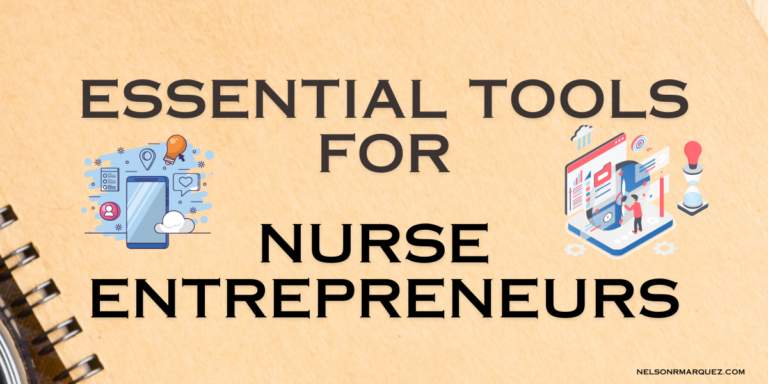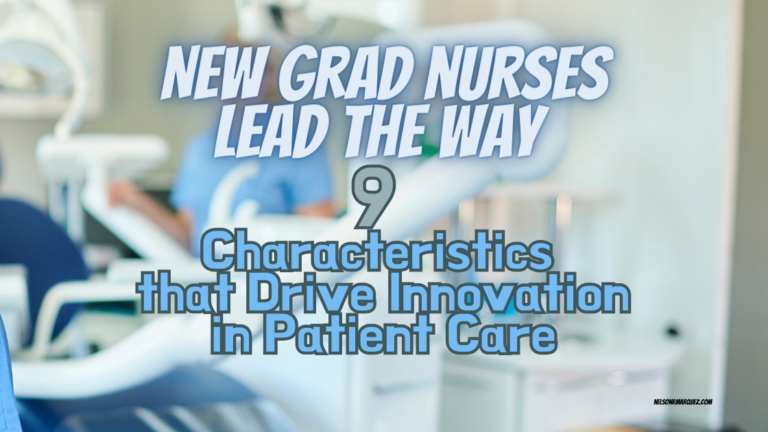27 Nursing Skills Every Nurse Should Master [2024]

Welcome, new grad nurses! As you begin your journey in the nursing profession, you’ll soon realize that mastering nursing skills is crucial to your success.
From basic skills like taking vital signs to more complex tasks like administering medications, there are 27 nursing skills every nurse should master.
So let’s take a closer look at these skills and start building your foundation as a competent and confident nurse for 2024.
Let’s break these skills down into 6 primary nursing skills categories:
Clinical skills
Interpersonal skills
Critical thinking skills and decision making
Emergency care skills
Technical skills
Administrative skills
Let’s begin…
Clinical Skills (hard nursing skills)
Clinical skills are your hands-on skills that are fundamental for delivering safe and effective patient care. Some refer to it as your hard skills.

Medication administration
A key aspect of medication administration in nursing is the use of the “six rights” or the “6 R’s” protocol: the right patient, right medication, right dose, right route, right time, and right documentation.
Nurses must follow this protocol to ensure that patients receive proper treatment and avoid medication errors. There are also mobile apps you can download to your phone to help you prevent medication errors.
Intravenous therapy (IV insertion)
Intravenous therapy, commonly referred to as IV therapy, is a medical technique that involves administering fluids, medications, or nutritional supplements directly into a patient’s veins through a catheter or needle.
This method of delivery is used when medications cannot be given orally or when rapid action is required.
This is probably one of the clinical skills that I struggled with in nursing school because I was not very good at handling sharp needles to patients. But with proper guidance and practice, you can master IV insertion very easily. If you need a review on how to insert an IV, here are the 6 easy steps.
Wound care
Wound care involves assessing the wound, cleaning it, and properly dressing it. Caring for wounds requires that nurses have a thorough understanding of the wound’s depth, location, and any potential complications that may arise.
Primary focus with this skill is infection control and wound healing.
There are wound care certification programs that can help you master this.
I recommend SNFWoundcare. They have a comprehensive guide to help you succeed with wound care management
Patient care assessments
Lung assessment
When it comes to lung assessment, there are different techniques that nurses can use. One of the most common methods is auscultation, where you can use a stethoscope to listen to the sounds of the lungs and chest.
Heart assessment
When conducting heart assessments, nurses need to pay attention to vital signs such as blood pressure, heart rate, and rhythm.
You can also use a stethoscope to detect any abnormalities in heart sounds, which can be a sign of a heart-related problem.
Bowel assessment
A thorough bowel assessment involves observing the frequency, consistency, color, and odor of the stool, as well as any discomfort or pain the patient may be experiencing. It’s important to have an open dialogue with the patient, as factors such as diet and medication can significantly impact bowel function.
Additionally, nurses should be familiar with various tools and techniques used to assess bowel function, such as abdominal palpation and auscultation.
Pain management
Pain management involves assessing the patient history, pain level and determining the best course of treatment to alleviate discomfort.
This may include medication, non-pharmacological interventions such as massage or heat therapy, or a combination of both. It’s important to monitor the patient’s response to the treatment and adjust accordingly to ensure their pain is adequately controlled.
Catheterization
This procedure involves the insertion of a thin, flexible tube into the bladder through the urethra to drain urine.
While it may seem overwhelming at first, with proper training and practice, inserting a Foley catheter can be a routine task in your nursing practice. If you need a quick guide for foley catheter insertion, here are the 7 easy steps.
Ventilator Management
Ventilation management involves the use of a mechanical device called the ventilator to help patients breathe when they can not breathe on their own.
As nurses, we need to have a good understanding of how to manage the ventilator settings to optimize the patient’s respiratory effort by monitoring their oxygen saturation levels, respiratory rate, and tidal volume.
NG tube insertion and care
NG tube, or nasogastric tube, is inserted through the nose, down the throat, and into the stomach. It’s used to remove stomach contents, deliver medication or nutrition, or relieve pressure in the stomach.
Inserting an NG tube requires a gentle touch and a steady hand. Once the tube is in place, proper care and monitoring are essential to avoid complications such as aspiration or infection.
Phlebotomy
As a nurse, you may encounter patients who require blood to be drawn for various reasons like to rule out infections or to check lab values.
This is where phlebotomy comes in – the process of drawing blood from a patient for diagnostic or therapeutic purposes.
Phlebotomy involves selecting the appropriate vein, cleaning the site, inserting a needle, and collecting the required amount of blood.
Tracheostomy care
A tracheostomy creates a direct airway through an incision in the neck into the trachea (windpipe), which allows patients to breathe easier.
When caring for a patient with a tracheostomy, it’s important to prioritize their safety and prevent any complications that may arise. This includes properly suctioning the airway, ensuring the tracheostomy tube is secure and clean, and monitoring for any signs of infection or difficulty breathing.
ECG interpretation
ECG, also known as electrocardiogram, is a test that records the electrical activity of the heart. The test provides valuable information about the heart’s rhythm, rate, and overall function.
An EKG strip consists of a series of waves and complexes that represent the electrical activity of the heart.
As a nurse, it is important to read and interpret these waves accurately to identify any abnormalities in a patient’s heart function. If you are pursuing your nursing career in telemetry, ICU, and cardiac units, click here to enhance your ECG interpretation.

Interpersonal Skills (Soft skills)
Interpersonal social skills refer to a set of abilities that enable individuals to communicate effectively, collaborate, and build relationships with others. For a nurse, this means being attentive, empathetic, and actively listening to patients, colleagues, and family members.
Effective Communication skills
Clear communication encompasses a range of skills, including active listening, clarity, empathy, and assertiveness. Practicing active listening involves truly hearing what the patient is saying and conveying that you understand their concerns especially with the nonverbal cues.
Strong communication also means using clear language that is easy for the patient to understand, without using medical jargon.
Patient Education
This involves assessing patients’ health literacy levels and addressing any barriers to learning, such as language or cognitive abilities.
Through patient education, nurses can improve outcomes, promote self-management of chronic conditions, and facilitate a collaborative approach.
Cultural Awareness
As healthcare becomes increasingly globalized, nurses need to understand the unique values, beliefs, and practices of different cultures. This includes being sensitive to language barriers, religious beliefs, and dietary restrictions.
Cultural competence also means avoiding making assumptions and asking questions to gain a better understanding of a patient’s needs and preferences.
Empathy and Compassion
Empathy and compassion are fundamental attributes of an excellent nurse, as they play a crucial role in providing high-quality care. These two skills allow nurses to connect emotionally with their patients, understand their conditions and feelings, and provide effective treatments.
Empathy allows nurses to put themselves in their patient’s shoes, providing the kind of support and care that patients need to overcome their medical challenges.
Compassion, on the other hand, is shown through acts of kindness, listening, and helping patients in any way possible.
Conflict Resolution
A good nurse understands that conflict can arise in the nursing field frequently, and being able to resolve it effectively can improve patient outcomes and team morale.
Daily tasks such as interpreting physician orders and managing patient care plans require collaboration and communication among nurses, which can sometimes result in disagreements.
Nurses need to learn how to adapt to high-stress environments.
Team Collaboration
In the ever-evolving world of healthcare, there are critical nursing skills that are highly sought after, and team collaboration is one of them.
Collaboration not only involves effective communication but also a willingness to share knowledge, skills, and expertise with the staff, patients, and their family members.

Critical thinking skills
Critical thinking involves analyzing information, identifying potential problems, and developing the best solution based on evidence.
It enables nurses to quickly assess a patient’s condition, make sound decisions, and provide effective interventions to improve patient outcomes.
The list below is a continuation of nurse skills associated with critical thinking.
Clinical judgment
Clinical judgment is a process that requires careful examination of a patient’s history, medical tests, and symptoms to determine the most effective treatment plan.
In other words, it’s all about putting the puzzle pieces together to get a full understanding of the patient’s condition and make an informed decision about their care.
Prioritization
Prioritization involves categorizing patient needs based on severity, time sensitivity, resources required, and potential risks to the patient’s health.
Nurses who adopt a systematic approach to prioritization can effectively manage multiple patients, improve patient outcomes, and reduce the likelihood of adverse events.
You will need to master this soft skill if you want to work as a triage nurse in the emergency room.
Critical assessment findings
Critical assessment findings skills allow nurses to look beyond the surface level of patient data and interpret their condition more comprehensively.
By analyzing assessment findings, nurses can detect underlying problems, identify trends, and chart an effective course of treatment for each patient completely.
Do you remember your assessment mnemonics: SAMPLE, PERRLA, and OLD-CARTS in nursing school?
Problem-solving skills
Nurses go beyond taking vital signs and administering medications.
Effective problem-solving skills require critical thinking, analyzing a patient’s condition, and weighing evidence to make informed decisions.
A good nurse will tell their doctors what orders need to be put in based on the patient’s needs and conditions.
Ethical decision making
Ethical decision-making involves weighing the potential outcomes of a decision against the moral principles of the healthcare profession.
For example, if a nurse is caring for a terminally ill patient requesting assisted suicide, the nurse must balance the patient’s autonomy with the ethical principle of doing no harm.
Emergency care

This is being able to respond quickly and efficiently can be the difference between life and death for the patient. The 3 certifications below are required depending on which hospital and unit you will be working for.
Basic Life Support (BLS)
Basic life support includes cardiopulmonary resuscitation (CPR), the use of an automated external defibrillator (AED), and airway management.
BLS aims to stabilize the patient’s condition and prevent further harm until advanced medical care can take over.
And remember BLS certification expires every 2 years. Click here if you need to re-certify.
Advanced Cardiac Life Support (ACLS)
ACLS’s objective is to recognize and treat life-threatening conditions such as stroke, heart attack, and cardiac arrest.
By mastering techniques like defibrillation, airway management, and medication administration, nurses can provide lifesaving care to their patients. Like the BLS, ACLS certification renews every 2 years
Pediatric Life Support (PALS)
PALS is a specialized training course designed to equip healthcare providers with the skills needed to provide life-saving care to critically ill children.
PALS certification renewal is every 2 years similar to BLS and ACLS
Technical Skills
These skills range from computer proficiency to configuring medical equipment.
Computer proficiency
Computer proficiency is a vital skill set that all nurses should embrace. Nurses should become proficient in electronic health records (EHR) and other healthcare software programs.
Whether it be entering patient data into an electronic medical record system, or utilizing a remote monitoring system to keep tabs on a patient’s condition, technology plays an important role in the nursing profession. This skill is super useful to nurses pursuing in telehealth or even blogging as nurse.
Equipment Operation
Knowing how to operate healthcare equipment is crucial, as it can determine the quality of care provided to patients.
From basic equipment like thermometers and blood pressure cuffs to complex equipment such as different patient lift devices, you as a nurse should have a firm understanding of how to operate and maintain each piece of equipment.
Administrative Skills

Administrative skills encompass a variety of tasks, such as organizing patient records, scheduling appointments, and staff management.
These skills are essential for nurses who want to pursue leadership positions in the nursing profession.
Staff management
Staff management skills are vital for nurses to ensure effective teamwork, efficient workflows, and quality patient care.
Effective staff management is the ability to delegate tasks appropriately, delegating tasks based on staff capabilities and workload to ensure patient safety.
Time management
It involves knowing how to allocate and prioritize your time effectively.
By doing so, you can ensure that you provide the necessary care to your patients while minimizing delays and disruptions to your work routine.
Here are some time management tools and mobile apps you can use for a more efficient patient care.
Conclusion
In conclusion, mastering the 27 nursing skills outlined in this article is crucial for every nurse in providing high-quality patient care. These skills range from communication and medication administration to wound care and emergency response.
By honing these skills, nurses can enhance their ability to work collaboratively with other healthcare professionals, prioritize patient needs, and manage complex medical situations effectively.
It is important to note that nursing skills are not just limited to technical abilities, but also encompass critical thinking, compassion, and empathy.
Therefore, nurses who strive to master these skills can make a significant difference in their patients’ lives and the healthcare industry as a whole.





